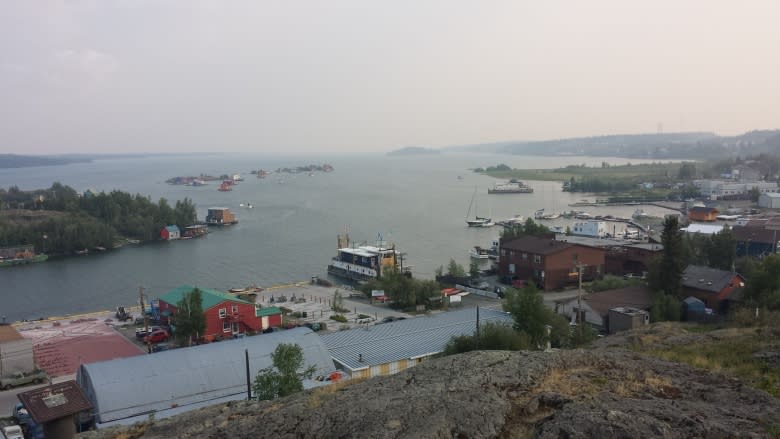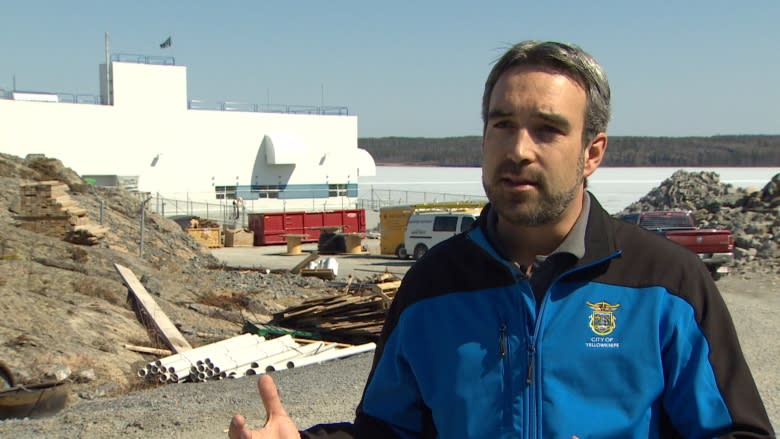Yellowknife River drinking water safest bet, in case of Giant Mine disaster: report
The city must decide what to do about Yellowknife's drinking water supply. The 49-year-old underwater pipe stretching to the Yellowknife River is leaking and has reached the end of its useful life.
According to a consultancy report commissioned by the City of Yellowknife and presented to council on Monday, the city should replace the 8.5 kilometres of aging drinking water supply pipe, instead of the alternative of drawing water directly from nearby Yellowknife Bay.
The AECOM Canada Ltd. report weighed in on two options: draw water directly from Yellowknife Bay with enhanced arsenic contamination filtering, at a lifetime cost of $18.2 million, or lay new pipe to the Yellowknife River, preserving the flow of drinking water from sources upstream of possible arsenic contamination associated with Giant Mine, at a lifetime cost of $33 million.
The report includes the most recent data on the quality of Yellowknife Bay water in terms of arsenic concentrations, which show bay water to be well below government maximums outlined in safe drinking water guidelines.
"It is drinkable without additional [filtration] treatment," said Dave Huebert, an aquatic toxicologist with AECOM, during his presentation to council.
"Over the past 12 years there has been a consistent and significant decrease in the surface water arsenic concentration in Yellowknife Bay for both total and dissolved arsenic."
One caveat is that sediment in the bay remains contaminated by arsenic, raising the spectre of storm conditions agitating the lake bed and so increasing arsenic concentration in bay water. But Huebert said even in that case arsenic concentrations would remain acceptable and manageable.
Costlier option still recommended
Even though it will cost more to bypass safe bay water, the report leans in favour of installing a new pipeline. This is in part because, according to the report, drawing drinking water from the Yellowknife River avoids the dangerous consequences of a "catastrophic" failure of the northwest tailings pond at the former Giant Mine site.
Huebert said the risk is that the pond could "release quickly … go through Baker Creek into the bay, and eventually make its way to the water treatment plant intake."
This would, Huebert said, "lead to the long-term loss of the drinking water supply of Yellowknife."
The odds of this happening are "extremely low" and relatively short term: "The window for this occurring is probably five or six years and only for about two to three months per year when the pond is at its maximum during spring," he said.
Remediation at Giant Mine includes the cleanup of the tailings pond. Huebert said it's expected that by 2026 a water treatment plant will be commissioned to treat the tailings pond water.
Once the tailings pond has been treated the risk of catastrophic failure will be gone, but for Mayor Mark Heyck, there are other long-term risks to consider.
"The Yellowknife River source has virtually zero risk associated with it," Heyck told CBC. "There will always be some level of risk of being downstream from Giant Mine even once the remediation takes place by virtue of the arsenic stored underground."
Heyck said the river source appears to be the preferred choice given all the information he's seen. He expects council to make a decision this spring or summer on how to proceed.
Federal funding expected
The estimated capital cost to build a new supply pipeline to the river is $27.8 million compared to a capital cost of $9.3 million to upgrade facilities to draw water from the bay. Over 25 years, capital and ongoing maintenance costs for the river source option would be $33 million, while the bay source option would cost $18.2 million over the same time period.
Heyck said he expects the city would not be on the hook for the full cost of building a new line to the Yellowknife River.
"By virtue of the fact it was an order of the federal government in the late 1960s to build the initial pipeline, we expect there will be significant financial support form the federal — and hopefully the territorial government as well — for that infrastructure project if it is the ultimate choice of council," he said



